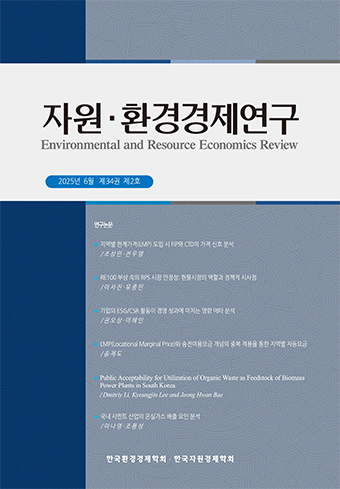Research Paper
Abstract
References
Information
This study aims to examine the environmental efficiency of power generation plants and explore its relationship with the Korea Emissions Trading Scheme (ETS) using a two-step approach. First, focusing on fossil-fueled power plants, we measure environmental efficiency scores using data envelopment analysis. Second, we identify the factors influencing these scores using bootstrapped pooled truncated regression, with particular attention to the relationship between environmental efficiency and emission permit prices. Our findings reveal that substantial variation in environmental efficiency exists across fossil-fueled power plants during the period from 2011 to 2022, while LNG-fired power plants outperform coal-fired power plants. Moreover, within the ETS framework, the findings show that higher emission permit prices are associated with improvements in environmental efficiency.
본 연구는 화석연료 발전소의 환경 효율성을 평가하고, 한국 배출권 거래제하에서 배출권 가격과의 관계를 분석하였다. 실증 분석을 위해 첫 번째 단계에서는 자료포락분석을 통해 환경 효율성 점수를 측정하고, 두 번째 단계에서는 부트스트랩 절단 회귀분석을 통해 효율성 점수에 영향을 미치는 요인들을 배출권 가격에 주목하여 분석하였다. 분석 결과, 2011년부터 2022년까지의 기간 동안 화석연료 발전소 간 환경 효율성에 상당한 차이가 존재하였으며, LNG 발전소가 석탄 발전소보다 더 우수한 환경 효율성을 보이는 것으로 나타났다. 또한, 배출권 거래제하에서 배출권 가격이 상승할수록 발전소들의 환경 효율성이 향상되는 것으로 나타났다.
- ADB (Asian Development Bank), The Korea Emissions Trading Scheme: Challenges and Emerging Opportunities, 2018.
- Anderson, B. J., and C. Di Maria, “Abatement and allocation in the pilot phase of the EU ETS,” Environmental and Resource Economics, Vol. 48, No. 1, 2011, pp. 83~103.10.1007/s10640-010-9399-9
- Charnes, A., W. W. Cooper, and E. Rhodes, “Measuring the efficiency of decision making units,” European Journal of Operational Research, Vol. 2, 1978, pp. 429~444.10.1016/0377-2217(78)90138-8
- Charnes, A., W. W. Cooper, J. Rousseau, and J. Semple, “Data envelopment analysis and axiomatic notions of efficiency and reference sets,” University of Texas. Center for Cybernetic Studies, 1987, pp. 1~12.
- Du, Z., C. Xu, and B. Lin, “Does the Emission Trading Scheme achieve the dual dividend of reducing pollution and improving energy efficiency? Micro evidence from China,” Journal of Environmental Management, Vol. 323, 2022, 116202.10.1016/j.jenvman.2022.116202
- Ellerman, A. D., F. J. Convery, C. de Perthuis, Pricing Carbon: the European Union Emissions Trading Scheme, Cambridge University Press, Cambridge, 2010.
- Färe, R., and S. Grosskopf, “Nonparametric productivity analysis with undesirable outputs: comment,” American Journal of Agricultural Economics, Vol. 85, No. 4, 2003, pp. 1070~1074.10.1111/1467-8276.00510
- Färe, R., S. Grosskopf, and D. Tyteca, “An activity analysis model of the environmental performance of firms-application to fossil-fuel-fired electric utilities,” Ecological Economics, Vol. 18, No. 2, 1996, pp. 161~175.10.1016/0921-8009(96)00019-5
- Fleishman, R., R. Alexander, S. Bretschneider, and D. Popp, “Does regulation stimulate productivity? The effect of air quality policies on the efficiency of US power plants,” Energy Policy, Vol. 37, No. 11, 2009, pp. 4574~4582.10.1016/j.enpol.2009.06.012
- GIR (Greenhouse Gas Inventory & Research Center), 2018 Korean Emissions Trading System Report, 2020.
- GIR (Greenhouse Gas Inventory & Research Center), 2023 Korean Emissions Trading System Report, 2024b.
- GIR (Greenhouse Gas Inventory & Research Center), 2023 National Greenhouse Gas Inventory Report of Korea, 2024a.
- Haynes, K. E., S. Ratick, and J. Cummings-Saxton, “Toward a pollution abatement monitoring policy: measurements, model mechanics, and data requirements,” Environmental Professional, Vol. 16, 1994, pp. 292~303.
- ICAP (International Carbon Action Partnership), Korea Emissions Trading Scheme, 2018.
- Jaraitė, J., and C. Di Maria, “Efficiency, productivity and environmental policy: A case study of power generation in the EU,” Energy Economics, Vol. 34, No. 5, 2012, 1557p.10.1016/j.eneco.2011.11.017
- Johnstone, N., S. Managi, M. C. Rodríguez, I. Hašič, H. Fujii, and M. Souchier, “Environmental policy design, innovation and efficiency gains in electricity generation,” Energy Economics, Vol. 63, 2017, pp. 106~115.10.1016/j.eneco.2017.01.014
- Kwon, O. S., “CO2 Emission and Productivity of Fossil-fueled Power Plants: A Luenberger Indicator Approach,” Environmental and Resource Economics Review, Vol. 19, No. 4, 2010, pp. 733~752.
- Kwon, O. S., and H. J. Park, “Imperfect Competition and Productivity: Korean Fossil-fueled Power Generation Sector,” Environmental and Resource Economics Review, Vol. 19, No. 1, 2010, pp. 3~21.
- Sarıca, K., and I. Or, “Efficiency assessment of Turkish power plants using data envelopment analysis,” Energy, Vol. 32, No. 8, 2007, pp. 1484~1499.10.1016/j.energy.2006.10.016
- Seifert, S., A. Cullmann, and C. von Hirschhausen, “Technical efficiency and CO2 reduction potentials—An analysis of the German electricity and heat generating sector,” Energy Economics, Vol. 56, 2016, pp. 9~19.10.1016/j.eneco.2016.02.020
- Simar, L., and P. W. Wilson, “Of course we can bootstrap DEA scores! But does it mean anything? Logic trumps wishful thinking,” Journal of Productivity Analysis, Vol. 11, 1999, pp. 93~97.10.1023/A:1007739507007
- Tyteca, D., “Linear Programming Models for the Measurement of Environmental Performance of Firms—Concepts and Empirical Results,” Journal of Productivity Analysis, Vol. 8, 1997, pp. 183~197.10.1023/A:1013296909029
- Tyteca, D., “On the measurement of the environmental performance of firms -a literature review and a productive efficiency perspective,” Journal of Environmental Management, Vol. 46, 1996, pp. 281~308.10.1006/jema.1996.0022
- Widerberg, A., and M. Wråke, The Impact of the EU Emissions Trading System on CO2 Intensity in Electricity Generation, IVT Swedish Environmental Research Institute Ttd, 2009.
- Wu, C., K. Oh, X. Long, and J. Zhang, “Effect of installed capacity size on environmental efficiency across 528 thermal power stations in North China,” Environmental Science and Pollution Research, Vol. 26, 2019, pp. 29822~29833.10.1007/s11356-019-05981-7 31410828
- Zhang, N., P. Zhou, and Y. Choi, “Energy efficiency, CO2 emission performance and technology gaps in fossil fuel electricity generation in Korea: A meta-frontier non-radial directional distance function analysis,” Energy Policy, Vol. 56, 2013, pp. 653~662.10.1016/j.enpol.2013.01.033
- Publisher :Environmental and Resource Economics Review
- Publisher(Ko) :자원 · 환경경제연구
- Journal Title :자원·환경경제연구
- Journal Title(Ko) :Environmental and Resource Economics Review
- Volume : 33
- No :4
- Pages :471-485
- DOI :https://doi.org/10.15266/KEREA.2024.33.4.471



 자원·환경경제연구
자원·환경경제연구






